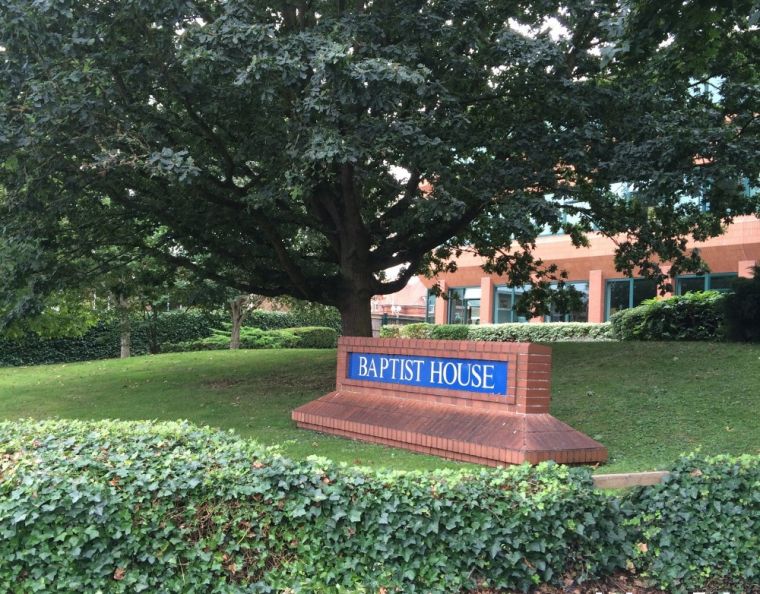Tough financial forecast for Britain's Baptists

The Baptist Union of Great Britain (BUGB) is facing a challenging decade ahead as it struggles with declining income.
The difficult financial forecast was presented by Treasurer John Levick at a pared down version of the BUGB's annual General Assembly held online on Wednesday night after the original gathering was cancelled earlier this year due to Covid-19.
Assembly members heard that the Union is struggling with a fall in funds and a large pension deficit, as well as increasing pressure from Covid-19 and the cost of training new ministers.
Mr Levick outlined the scale of the challenge ahead as he warned that total Union income stood at £5.38m at the end of 2019, representing a 5% drop from 2018.
The BUGB's Home Mission Appeal - the annual appeal to finance Baptist churches and mission in the UK - fell by 1% in the last year to £3.78m.
Commenting on the figures, Mr Levick said: "The fall in Home Mission giving may seem inconsequential but I make no apologies for repeating my message from previous years that this continual slow reduction over time, and taking inflation into account, means our ability to fund churches, mission projects, association and specialist teams will reduce by 20% in real terms if current trends continue over a 10-year period."
Mr Levick said the Union "cannot rely on other sources of income" to buoy up the funds, with legacies falling in 2019 and continuing to "fluctuate from year to year", and investment income suffering because of a recent injection of funds to shore up pensions.
He admitted pensions had been a "major concern" for the BUGB in the last 10 years and a "particular financial drain on the Baptist family", but said "substantial progress" had been made in reducing the pension deficit to £14m today.
"Whilst to some, we may seem to have a lot of money available, the free funds available are only about 12 months' expenditure," he said.
The Home Mission Fund suffered a "large drop" in giving in April, after Britain went into lockdown, he revealed, but this has since been recovered in the following months, he said.
"Our reserves saved us from having to take immediate action to reduce expenditure," Mr Levick continued.
READ MORE: Financial impact of Covid has been 'catastrophic', says Diocese of Sodor and Man
"This has proved to be important for our specialist teams, who have worked particularly hard to keep you informed of all the government guidance as it's been issued, and our regional associations to maintain support to churches."
Looking to the future, Mr Levick predicted an increase in demand for funding to support trainee ministers, which he said had become "an increasing problem" since grants were replaced by student loans.
"Further, most of our ministerial students are ineligible for student loans because they've already taken loans for prior degrees," he said.
"Our colleges have been provided financial support in various ways but this has been both insufficient and is unsustainable in the long term," he said.
"Finance is a major problem for many as they go through training."
The BUGB has set up a group to report back on ways in which future ministers can be supported through their training.
"This will almost certainly place more demands on our funds but we see it as crucial that we support those who have been called to service through ministry," he said.
Despite the financial challenges, Mr Levick commended the BUGB for the financial assistance it has been able to provide in two major areas in the last year, one of them being emergency support for students of Spurgeon's College.
The Office for Students, England's higher education regulator, last year rejected Spurgeon's application, leaving new students ineligible for financial help from the Student Loans Company.
The BUGB responded by providing emergency funding at short notice to enable students to continue their studies while Spurgeon's appealed the decision - which was eventually successful.
Trustees, Mr Levick continued, were also able to this year set aside a £1m emergency fund for Baptist churches negatively affected by Covid-19. The fund has so far issued grants to 20 churches to help them through the current difficult climate.
BUGB General Secretary Lynn Green said the Union was in "uncertain times" and that the pandemic had forced churches to embrace news methods in sharing the Good News with the world.
However, she said God's mission was "unchanging" and that the goal for the BUGB remained "growing healthy churches".
"Never has that been more important than now," she said.
"We want to see growth, we want to see new disciples, people finding faith," she said.
"We want to be in relationship with one another. This time of pandemic has shown us how much we need each other.
"We need each other's encouragement, we need each other's support, we need each other's prayer, and we need to have that sense of common purpose when things are difficult."
Rev Green went on to set out a number of priority areas for the Union, including digital mission, deepening discipleship, and strengthening the commitment to children and young people.
"God is doing a new thing and we want to be doing new things in new ways too, and this has become even more important during the pandemic," she said.
"Working out what mission and discipleship look like in this season needs new and creative thinking. We'll need to be willing to leave behind some of the old familiar ways."
She continued: "If we had any doubts about the importance of digital mission at the beginning of 2020, we certainly don't now.
"Connecting, engaging and harnessing the potential of the digital revolution is key, and we also want to reflect biblically and theologically on the impact of digital and virtual reality, and think about what it means to be human."











